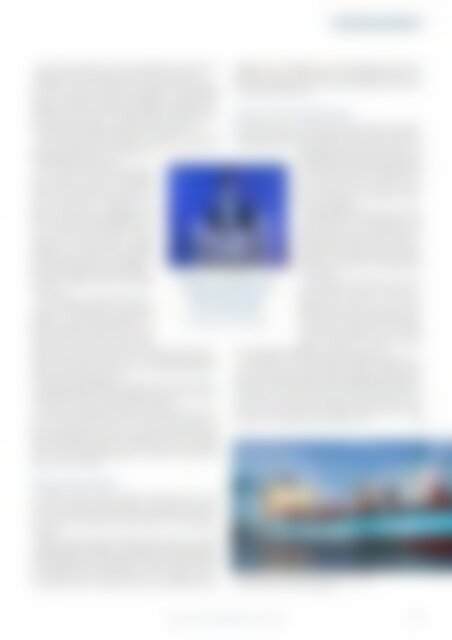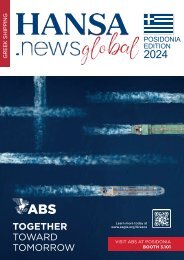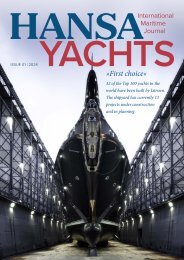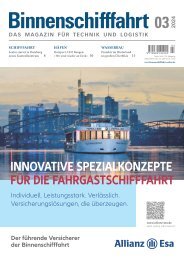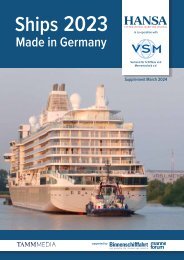HANSA 02-2024
Cosco, HANSA, Hapag-Lloyd, Maersk, Schiffbau, Maritim, Schifffahrt, MPP-Schifffahrt, Ladungssicherung, Ship Efficiency, M&A
Cosco, HANSA, Hapag-Lloyd, Maersk, Schiffbau, Maritim, Schifffahrt, MPP-Schifffahrt, Ladungssicherung, Ship Efficiency, M&A
Sie wollen auch ein ePaper? Erhöhen Sie die Reichweite Ihrer Titel.
YUMPU macht aus Druck-PDFs automatisch weboptimierte ePaper, die Google liebt.
SCHIFFFAHRT | SHIPPING<br />
However, Goh added: »In terms of availability and costs and who<br />
is going to pay for the premium, I believe it can be sorted out.«<br />
Biofuels can also be difficult to authenticate if these contain<br />
fatty acids, said marine fuel testing specialist Veritas Petroleum<br />
Services’ president (strategic partnerships), Captain Rahul<br />
Choudhuri. Veritas, which was spun off from classification society<br />
Det Norske Veritas, is working with the Global Centre for<br />
Maritime Decarbonisation to better authenticate biofuels.<br />
Choudhuri said: »Biofuel feedstock comes from a variety of<br />
sources including edible vegetable oils, animal fat, waste, and<br />
components; but how do you figure out<br />
what the feedstock really was?«<br />
He asserted that the bunkering supply<br />
chain is prone to fraud, and biofuels,<br />
when delivered through several parties,<br />
could be inconsistent when stemmed to<br />
the receiving ships. Choudhuri continued:<br />
»The proof of sustainability will<br />
become really tricky going ahead. However,<br />
trials have proven biofuels possess<br />
fatty acid chains that produce a unique<br />
profiling. If you think your feedstock<br />
should be palm-based and the fingerprint<br />
shows clearly that it is not – then that’s it –<br />
because the fingerprint just doesn‘t fail irrespective<br />
of which country the biofuel<br />
comes from.«<br />
Goh, is however, optimistic that the issues<br />
surrounding biofuels can be resolved:<br />
»There’re a few industrial standards (for<br />
biofuels) in place but whether one is accepted<br />
in another location, and vice versa,<br />
that remains to be seen. It’s a little bit fragmented<br />
at the moment but I’m sure, collectively, within the industry,<br />
that’s the obvious route that is seen. Biofuels are the option<br />
for existing ships and I’m sure we can achieve something together<br />
if we move towards that.«<br />
Richard Ho, deputy general manager (fuel) at ONE, which is<br />
also piloting biofuels, said that ship operators do not just choose<br />
fuel types on a whim, and then make the purchase.<br />
Ho said: »We engage our partners on the ship owners’ side to<br />
know what they want. We work with our labs to learn what are<br />
the new requirements. What can we do if the fuel fails? It’s not<br />
just about buying the fuel. The complexity increases multiple<br />
folds. We work with regulatory bodies to ensure we move things<br />
forward and be ahead of the game. It’s the whole ecosystem that<br />
helps us to be successful.«<br />
»People aren‘t going to start<br />
making methanol if people<br />
don‘t build the ships.<br />
It‘s a bit of a gamble«<br />
Alex Hartnoll from X-Press Feeders<br />
200,000 t a year or 50,000 t a year, everybody gets an equal seat at<br />
the table. If you’re a smaller operator, you just don’t have access to<br />
that kind of information and you won’t be offered a contract even<br />
if you wanted to have one.«<br />
Operators have to think long-term<br />
Ho said that supply considerations mean that ship operators have<br />
to think long-term when buying alternative fuels. Previously,<br />
ONE’s legacy owners, Mitsui OSK Lines, NYK Line and ‘K’ Line,<br />
purchased conventional fuels three to six<br />
months ahead. The move from a single fuel<br />
to a multi-fuel world has changed that. Ho<br />
said: »We’re looking at a multi-year horizon<br />
to make sure we can procure a certain<br />
level of alternative fuels, whether it’s ammonia<br />
or methanol.«<br />
Meanwhile, liquefied natural gas (LNG)<br />
is still favoured as a transition fuel, said<br />
Shell’s global network development and<br />
strategy manager, Khoo Hwee Lan. She asserted<br />
that the oil major’s involvement in<br />
© Lee<br />
shipping is multi-fold, being a fuel supplier<br />
as well as an operator of oil tankers and<br />
LNG carriers.<br />
»We believe that biodiesel and renewable<br />
fuel will be the way to go. LNG is the<br />
lowest-carbon, lowest-cost fuel that is<br />
available at scale out there, so we start with<br />
that in the first instance. The LNG production<br />
capacity is around 450 mill. t today,<br />
and the receiving capacity is over 1 billion<br />
tonnes. So there’s a lot of LNG out there<br />
that’s available for shipping to decarbonise«, she said.<br />
Khoo alluded to the International Chamber of Shipping’s recent<br />
estimate that by the mid-2030s, 800,000 seafarers would<br />
need to be trained to handle ammonia, hydrogen and methanol.<br />
She said: »LNG is a fuel that has been used for the last 50, 60 years<br />
so it has an excellent track record.« Shell has delivered LNG as<br />
bunker fuel to customers on the largest container vessels to tugboats<br />
so we’ve done more than 300 ship-to-ship operations. That<br />
also shows it’s not difficult to train up the crew.<br />
<br />
Joining a bunker alliance?<br />
To address concerns about expensive alternative fuels, ship<br />
owners and operators should consider joining a bunker alliance,<br />
such as the one headed by BW Group’s products tanker arm Hafnia,<br />
which now procures marine fuels for 20 third-party<br />
members.<br />
Hafnia’s general manager (bunker) Kasper Sorensen, said the<br />
company purchases bunkers for 1,300 ships now. He asserted that<br />
such group buying can help smaller operators with substantially<br />
less fuel requirements than big players. Sorensen added: »To get a<br />
seat at the table, you need to have some sort of critical mass. For<br />
us, whether you buy a million tonnes a year, whether you buy<br />
© Port of Rotterdam<br />
Ellen« delivers green methanol in the port of Rotterdam<br />
or the first time to a Maersk newbuilding<br />
<strong>HANSA</strong> – International Maritime Journal <strong>02</strong> | 2<strong>02</strong>4<br />
37


